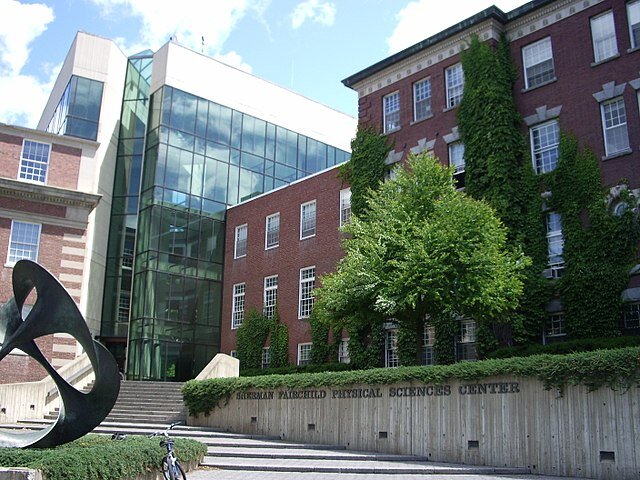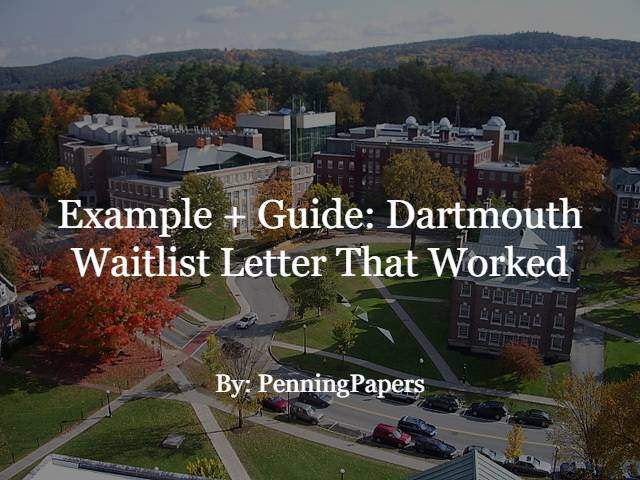Writing the Dartmouth waitlist letter can be a pain in the *ss. After all, this is your last shot at an Ivy League. Your fate hinges on the next few words you’ll write.
It doesn’t help that Dartmouth typically accepts fewer than 10% of students: “zero in some years to dozens in others.” So, that makes the Dartmouth waitlist letter especially scary.
Yikes!
Let’s not forget: you’re applying for a school with a very, very competitive admissions pool. If your competitors were also waitlisted, you can bet they’re just as smart as you!
So, yeah. It’s not east.
But, make no mistake. Most people struggle to write the Dartmouth waitlist letter. In fact, most students struggle with writing waitlist letters in general. (not that it’s their fault; schools don’t teach how to write them!) That means less competition for you! If you can write a stellar waitlist letter, you’ll stand out from the rest of the admissions pool. A lot. Trust us. Good writing goes a long way.
In this article, we’ll cover 3 things.
First, we’ll discuss our client who was accepted into Dartmouth from the waitlist pool and their profile stats. Second, we’ll show their Dartmouth waitlist letter that worked. Third, we’ll deconstruct the elements of the waitlist letter that made it strong.
This will help you have a good idea of what it takes to get accepted from the waitlist and what you should write in the waitlist letter.
So, without further ado, let’s get right to the guide.
Table of Contents
- Stats Needed For Dartmouth Acceptance
- Dartmouth Waitlist Letter That Worked
- What Made This A Strong Letter?
Professional College Application Help.
Contact us. We'll get to you within 24 hours.
Stats Needed For Dartmouth Acceptance

Academic Performance
The client we worked with who was waitlisted and later accepted into Dartmouth had a 4.0 unweighted GPA. This was paired with nearly the max amount of AP courses possible to take in their school.
Now, a few things to keep in mind.
This is proof of just how hard it is to get accepted into a T20 school. Even with the highest possible GPA and highest academic rigor, our client was first waitlisted before being accepted.
Clubs, Projects, and Activities
- Captain of the varsity baseball team
- Planned + operated donation drive
- Volunteer campaigns
- Managing Instagram activism account.
- Club soccer
While this looks like a lot, note that it’s not always about the number of activities or extracurriculars you have.
Instead, it’s about the quality of those extracurriculars.
Holding leadership titles and positions doesn’t say as much as you think. After all, anyone can “fake it ’till they make it.” What’s more important is the achievements in said position.
This is the difference between good and great. Those who belong to great schools are the ones who let actions speak instead of titles.
If you don’t have nearly enough extracurriculars or notable achievements made, you should consider conducting a project in your free time before the deadline. It’s not impossible, and it’s certainly valid depending on how you execute it.
If your GPA, academic rigor, or extracurriculars are low, we heavily recommend college admissions essay editing services. Our client was lucky to get accepted off the waitlist. So, if your profile is far from the upper percentile, writing a strong waitlist letter is your next best bet for getting accepted.
Dartmouth Waitlist Letter That Worked

Dear Dartmouth Admissions,
Thank you for taking the time to consider my application. After careful consideration and thought, it is inexorably clear to me that Dartmouth remains my top choice for actualizing my future aspirations. Should I receive an offer, I am wholly certain to enroll.
Because I am leaning toward a career in public service, but am ultimately undeclared in major, Dartmouth’s D-Plan would best articulate my goals. Its breadth of education and unique array of resources provide the diverse opportunities needed to help me define what being a public servant truly means to me. In addition, the recent events since my application have solidified my certainty that my path in public service is best suited for Dartmoth.
With Bridging the Gap, the refugee service organization I co-run in my high school, I planned and executed a new project that would help Somalian and Syrian refugees who were soon to be rejected by the US government and administration. I along with 2 others ran a donation campaign to collect winter clothes. We carefully parsed through each donation to ensure donations met proper standards and weren’t just trashed fabrics.
We also conducted awareness programs convincing people to donate and provide more resources to said refugees. Upon working in Bridging the Gap, I was quite surprised to find just how deeply integrated and vital the world of marketing and conversions was to secure the right number of donations. Without proper marketing, we would not have reached the number of donations we had. Methods such as non-invasive speech and guilt-free phrases helped put potential donors in a position of comfort and therefore more likely to contribute to our cause. This experience revealed to me how I should implement multi-disciplinary approaches to my future social justice projects, and I believe that could be best achieved through Dartmouth’s wide breadth of academic rigor.
In addition, I am leading the Sandy Springs Student Association: a wider volunteer campaign to support multiple causes which would benefit my community.
One such cause is in helping food scarcity and food insecurity amongst low-income individuals in our community. I worked with the Association to provide volunteer service to the Solidarity Sandy Springs food pantry. During our volunteer service, we provided low-cost food to individuals without discrimination or the requirement of proof. This operated as an “If you’re here, you probably need it” principle. Our added volunteer labor streamlined the process. Also, over time, I’ve come to understand and connect with the customers who were truly in need and required the discounted food. I believe this experience gave me a closer connection with the dispossessed; it’s a relationship with the underprivileged that I think as someone of a privileged class is absolutely mandatory for me to establish before I could have any right to conduct big philanthropic projects in the future.
In congruence with my future in political activism, I am taking the time to increase the rate of voter registration in my school. I have learned a lot about activism efficacy and persuasion methods through this personal project. For instance, I noticed many non-voters abstained from political activities because they felt their votes would not create any meaningful impact. I initially thought the mathematics and info charts would convince people otherwise, but no amount of logical persuasion would work. Instead, I discovered that empowerment and psychological uplifting were the crux of the issue; by empowering moderates into accepting that their actions have more impact than they may realize, I am significantly increasing the voter registration in my school.
I am also gearing up to build on my previous internship helping in the Raphael Warnock Senate Re-election campaign; there, I’ll fight for his goal to protect against the creeping attack on fair voting practices in Georgia, combat discrimination against minorities and immigrants, support humanitarian policies towards refugees, and normalize the existence of science and the climate crisis to an otherwise polarized population — important issues that drive me to action. I am excited that my work and my vote will count in 2022.
To add to my involvement in politics, I’ve created hourslate.com: a platform to share some of my opinion writing as thoroughly as possible. It was designed as a way for those leaning center and slightly left in politics to have a more logical and thorough understanding of politics that would avoid making political discussion unappealing through the vitriolic vigor often in politics. I’ve planned and developed it for a few weeks, and have recently launched the site; however, there are still many things to learn in the realm of online publishing.
Along with this work, I continued to push for peak performance in my sports. I recently completed my Select Travel Soccer journey, which began four years ago, with great satisfaction; I delivered the final goal in the final tournament for my 8th in State ranked team. I am now playing my final season of a 14-year passion as a baseball player, as a captain, and as the only four-year varsity player. So, I plan to continue leading my team through adversity to the best of my capability as a captain and team player.
I continue to work vigorously on my academics during my senior year. Though my intended educational path follows the Humanities, and despite my challenges with math and science due to my Dyslexia, I have not shied away from honors and AP courses in those disciplines. I have used my senior year to explore other subjects to ensure my future Humanities education does not go unsupplemented. By exploring subjects such as Honors Physics, AP Computer Science, and AP Calculus, I hope to have a breadth of knowledge that would help me streamline my interdisciplinary approach to social justice. Although adjusting to the school’s new grading system has been tricky, I am excited and look forward to what I can learn during the rest of my senior year’s challenging curriculum. In fact, I am grateful to have found a new fascination with physics that will help me as I continue to seek answers to my frequent question: “why?”
Thank you for your time and consideration in the review of my application. I am hopeful that I will be joining the Dartmouth community in the fall.
Accepted Dartmouth Applicant 2022
What Made This A Strong Letter?

There are a few elements to this waitlist letter that make it strong. Implementing these elements should improve your acceptance rate.
These best practices help students stand out and be different. It requires a careful hand and surgical writing.
So, tread lightly and remember to check your work.
Correlation with Dartmouth’s Resources
It’s important to tie in your goals with the resources available at Dartmouth. Take a look at the second paragraph of the Dartmouth waitlist letter example that worked.
“Because I am leaning toward a career in public service, but am ultimately undeclared in major, Dartmouth’s D-Plan would best articulate my goals. Its breadth of education and unique array of resources provide the diverse opportunities needed to help me define what being a public servant truly means to me. In addition, the recent events since my application has solidified my certainty that my path in public service is best suited for Dartmoth.“
Example Letter Second Paragraph
In this paragraph, our client used their interest in public service to their advantage. They used the Dartmouth D-Plan program to also show how the school will be a great fit for their future career. By doing this, our client has achieved a few useful effects.
They are able to show that because Dartmouth is a strong fit they have every reason to dedicate to the school should they be accepted. This is important for the school’s retention rate. It also shows the admissions officers that the applicant has a plan that they want to execute when they attend there. It’s important to show the admissions officers your intent and plans on what to do on their campus. Even for undeclared students, showing the admissions officers an articulated plan for figuring out what to do is crucial.
Demonstrating Character: Humility
One of the most uncommon elements of strong application letters is strong humility.
This does not mean being a humble bragger, and it does not mean purposefully downplaying yourself when you know you’ve achieved a lot. Admissions officers can typically see through facades. So, you need to demonstrate true humility by weaving it through your waitlist letter.
Now, what does true humility look like in writing? To know how to write it, we first have to know what it is.
True humility could be thought of as the wisdom of knowing you know both a lot and nothing at all.
Imagine someone you know to be truly humble. They are someone who is competent and capable of many things. However, they know to be humble because they are wise about the limitations of their capabilities. When you imagine a competent student attending a school as competitive as Dartmouth, humility would mean they have strong marks and qualifications; yet, they can admit that they don’t know everything that they want to do.
This is a crucial element to not just application essays, but being a student as a whole.
Realistically, everyone knows that people between the age of 18-24 can’t possibly know as much as they think they do. Youth is inexorably tied up with ignorance; though, that’s why students must be open to learning when they are in university. That is why they attend. So, do not show that you are too smart to learn anything else. You also want to demonstrate the desire to learn, which is where we get to the next point.
The Desire to Learn
This goes in line with what we mentioned in the previous section. One of the great traits of our example Dartmouth waitlist letter is that it demonstrates an inherent desire to truly learn.
The point of university is to use the talents and skills you’ve already had to good use. Dartmouth is a melting pot of unique students who all have their own wisdom to share. So, demonstrating both a desire to learn and an aptitude for collaboration and fit with the Dartmouth community will help show the admissions officers that you’re not just another student looking for the Ivy League name.
The desire to learn and grow is what helps admissions officers know that you are true, at heart, a student. This is a mindset that helps many students grow and develop enough to create great things. So, it is crucial that you weave the thirst for knowledge into your waitlist letter. By demonstrating this character trait in your Dartmouth waitlist letter, you will show you have the right growth mindset to tackle the obstacles to come from Dartmouth.
Streamlined Communication
This is an important element of any waitlist essay. However, this is especially true for the Dartmouth waitlist letter. You cannot get accepted through the waitlist process without properly smooth and streamlined communication. This means the flow of your writing needs to make sense and be easy to read through.
More often than not, we come across applicants who are very nervous. And hey: there’s a good reason for it!
However, this nervousness often manifests as choppy and disoriented sentences in your waitlist letter. It’s critical to make your sentences smooth and straightforward. You don’t want to overcomplicate your writing, and you don’t want to shove as many things as you can in one sentence.
Often times, students will believe they need to shoehorn everything they can in the waitlist letter so that they’ll have more to talk about than other applicants. But, this is not good practice. To write a good Dartouth waitlist letter that actually gets you in, the admissions officers must understand you and the character you demonstrate through your writing. So, your writing must be clean and straightforward. This helps the admissions officers take a deeper look into who you are and whether you’d be a great fit for the school. If you don’t do this, it’s easy for them to get lost and even find you too disorganized to formulate your thoughts for college.
If you are still struggling to write your Dartmouth waitlist letter, don’t worry! We’re here to help. Schedule a free 30-minute phone consultation, and we will work with you to help you strengthen your Dartmouth waitlist letter to get you accepted.

